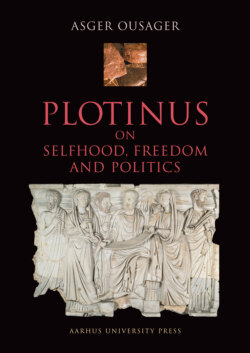Читать книгу Plotinus - Asger Ousager - Страница 6
На сайте Литреса книга снята с продажи.
Freedom
ОглавлениеGiven that human souls have their origin directly in the One, what, then, distinguishes them from each other? There has to be a sufficient reason for the distinction. The One itself is not only the ultimate cause (aition) of everything, but also the ultimate reason (aitia) for everything including itself, according to Plotinus’ interpretation of Plato, which he formulates as a response to the problem surrounding the relation between arbitrary will and modal necessity in the Euthyphro. I argue that Hadot’s thesis of the One in Plotinus as a cause of itself (causa sui) on the other hand, is unwarranted.
Providence is the name of the sufficient reason that governs everything flown from the One towards the best, i.e. towards unification. In order to avoid indistinctness with the resulting identity of human souls in only one human soul, it would be necessary for the preference (proairesis) of each soul to be different from that of any other soul from the very beginning. Consequently, the series of resulting choices and dispositions of souls will be quite different from each other. The series and the decisive beginning of the series are contained within the Form of the particular soul. Providence also determines which human souls will ascend to ultimate unification with the One. Human unification with the necessary determinant, namely the One as “absolute freedom”, must have indeterministic causal consequences for the whole causal hierarchy. In particular, such indeterministic causal consequences will follow for the human soul attaining ultimate unification, as the determinism of Providence again determining the Form of the particular is disrupted by this intervention. This Form will, however, be recreated and adjusted to the new state of affairs generated from ultimate freedom, as the human soul must descend again. Here, Plotinus is probably giving what he believed to be the Platonic answer to the problem surrounding the relation between self-determination and determinism discussed by the Stoics and Alexander of Aphrodisias – a discussion most recently scrutinised by Susanne Bobzien. Plotinus denies self-determination of the One and consequently the One as a causa sui because this premise would restrict the One’s absolute measure of freedom. Instead he affirms human self-determination as derived from that absolute freedom.
